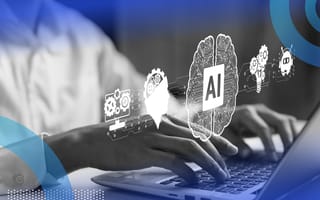What we now refer to as artificial intelligence is really a set of technologies within the broader field of IT. Despite its name, IT has been about much more than providing information for quite some time. Its purpose also includes automating tasks and acting on our behalf, taking on increasing responsibility as we trust it more. This means agency was implied right away. Once we’ve learned to trust those technologies, we could outsource many important tasks to them, like regulating oil refineries and nuclear reactors.
Over time, algorithms evolved, decision trees blossomed, and we delegated decisions to machines. It’s unclear what percentage of IT goes toward making decisions without our involvement and what provides us with information. My guess is that information (even excluding entertainment) still prevails. Most of the content is either created by us for us or by systems for our consumption and decision-making.
Understanding AI as a Tool
Technical innovations in IT are all about automating tasks and taking on increasing responsibilities. While AI can do a lot, it requires human input to provide the desired results. For this reason, it’s no different than any other tool, like personal computing, the cloud or social media.
At the same time, I wouldn’t be surprised if that’s not the case. Perhaps all the decisions we’ve asked machines to make for us far outweigh the number of decisions we make ourselves, excluding all the social media posts, videos, and whatever else kills our time so efficiently.
This brings us to an important question: Does AI stand apart from other IT systems? Is there anything so unique about AI that sets it on a different trajectory from other innovations, like personal computing or social media?
Understanding the Myth of Artificial Intelligence
When the term artificial intelligence was coined in the 1960s, “Advanced Data Processing” (ADP) was also suggested. It explains what lies behind the abbreviations and concepts. In my opinion, ADP better describes what’s happening today. A less poetic term for AI is a lot more beneficial.
Something with “intelligence” in its name immediately takes a special place in our imagination. We’ve long assigned human qualities to animals, trees, and inanimate objects. It’s no surprise that we now imagine computers reading, thinking, and even feeling. But they do none of these things. ChatGPT doesn’t read input or think about its responses in any human sense.
The processes involved are different, and perhaps we don’t have sufficient language to describe them similar to how we didn’t have a language to describe quantum effects when they were uncovered.
That doesn’t mean computers aren’t intelligent, they just have a different kind of intelligence. A calculator is more intelligent than us at multiplying large numbers, but it would be absurd to hold a conversation with it or expect anything beyond mathematical operations.
Does AI Provide a Competitive Advantage?
Now, to the core question: Can AI provide a strategic advantage to a business?
First, we need to define strategy and competitive advantage. Richard Rumelt’s book Good Strategy Bad Strategy offers a clear framework: Strategy is about identifying the true nature of your competitive challenge and solving it in a unique way. It doesn’t have to be a secret, just overlooked by others.
The challenge in business is understanding the reality of the market and finding an insightful way to succeed. If you can do that, you have a strategy. Otherwise, you just have business plans, projections and roadmaps.
So, can AI provide this kind of strategic advantage?
Perhaps AI can help businesses understand the nature of their competitive challenges by analyzing data and uncovering patterns. However, humans still need to frame the question and guide technology to the answer. At present, AI can’t independently ask or answer strategic questions.
AI might assist with solving competitive problems, but it can’t replace human ingenuity. Technology can help, but it won’t do the work for you.
Strategic advantage comes from integrating processes and systems within your organization in a way that reinforces one another. Whether or not you have a chatbot assistant, this remains a human responsibility.
The bigger issue here is that technology provides a strategic advantage mainly to its creators. For example, OpenAI could gain a competitive edge by being the platform everyone uses. However, for AI consumers, the advantage is short-lived. Competitors can quickly catch up by copying the innovation. In an open market, best practices spread rapidly unless there’s legal protection or a monopoly.
Why AI Is Just a Tool
Historically, innovations in IT have always followed the same pattern: hype builds, businesses are urged to adopt new tech, and those that do reap initial benefits. Eventually, the technology becomes mainstream, and its competitive edge fades. The enterprise runs just to stay in place.
Adopting AI, like any other technology, won’t give businesses a lasting edge. True competitive advantage comes from deep insights into customers, markets and internal processes that others can’t easily replicate.
Give us something faster, cheaper, and better, and we’ll adopt it. Whether you call it AI or ADP, the name won’t change the fact that businesses face constant challenges. While AI offers valuable tools, it doesn’t hold the key to strategic success. Thankfully, companies like Google and OpenAI keep coming up with things like transformers and ChatGPT.
The companies that will thrive are those that truly understand their customers and design systems that work seamlessly together. AI can help, but it won’t do the work for you.





